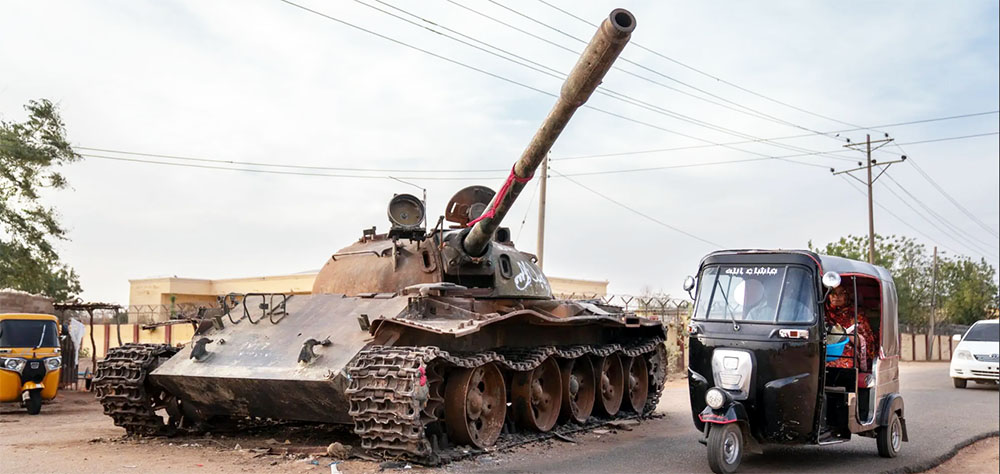
Unexploded ordnance: A new threat to families in Khartoum
Agencies
Of course, unexploded ordnance and rockets are scattered throughout the streets, homes, schools, and shops across the Sudanese capital, Khartoum, as families begin to return to buildings once controlled by the Rapid Support Forces.
Sudanese and UN clearance teams are inspecting the situation and seeking to secure the premises. But they say they need more staff and funding, especially after the US aid cut.
A resident named Abdelaziz Ali, wearing glasses and a gray beard, emerged from a primary school in the Al-Amarat neighborhood of the Sudanese capital, Khartoum, trembling with shock.
Like thousands of others, he returned to inspect buildings retaken by the Sudanese army after two years of civil war, only to find a new threat lurking among the citys rubble. In his case, it was an unexploded ordnance under a pile of old tarpaulin.
Ali, 62, worked as an administrator at the school before the war broke out in April 2023 and the paramilitary Rapid Support Forces (RSF) invaded the city.
"How could I not be afraid?" he told Reuters, standing outside the school, noting that the shell was about 40 centimeters long and looked like an anti-tank missile. "This is a school for children, so all this stuff has to be removed... We cant remove anything until they come and remove it all."
In the Al-Amarat neighborhood of Khartoum, Ali pointed to other shells on the dirt road between the school and a kindergarten. Several missiles were seen in wrecked vehicles.
Another building guard said authorities had found and removed munitions and drones in the basement. But the anti-tank missiles were still there. "We fear that one explosion could destroy the whole place," he added.
More than 100,000 people have returned since the army recaptured Khartoum and much of central Sudan amid a conflict that began over plans to integrate the Rapid Support Forces (RSF) into the armed forces.
The Rapid Support Forces (RSF) still control large areas of western Sudan and have shifted their combat tactics from ground incursions to drone attacks on infrastructure in army-controlled areas.
The Sudan National Mine Action Center (NMAC) announced the destruction of more than 12,000 explosive devices since the war began. The centers director, Major General Khaled Hamdan, said that an additional 5,000 have been discovered since operations expanded to include recently recaptured territory.
At least 16 civilians have reportedly been killed and dozens injured by munitions explosions in recent weeks. There are fears that the actual death toll could be higher.
"We only have five working teams in Khartoum at the moment," said Jamal al-Bushra, director of the NMACs Khartoum office.
Efforts in the capital are focused on main roads, government buildings, and medical centers in central Khartoum, the area that witnessed the heaviest fighting.
Hamdan said that launching optimal demining and survey operations requires 90 million.
Teams pick up the shells by hand and carefully place them in old bags and boxes or side by side on a protective layer of dirt on the back of a small truck with metal sides.
Volunteer groups have undertaken some of these efforts.
"We receive about 10 to 15 reports a day, and we try to remove as many as we can," said Hilu Abdullah, who heads one of the teams working in the Ombada neighborhood of Omdurman, a city adjacent to Khartoum.
The UN Mine Action Program (UNMAP) nearly shut down in March after US funding was cut, until Canada stepped in to support it.
"We need hundreds of teams. We only have a few," said Siddiq Rashid, the programs head in Sudan. He added that problems obtaining travel permits also hamper the work. "Its very worrying because these areas need to be examined by a specialized team" before people can return.
Rashid said that demining teams have only conducted surface surveys, especially in areas outside Khartoum, which have also been severely affected. If proper surveys are not in place, residents will be left to fend for themselves.
A 16-year-old boy lost his left arm and was severely injured when a shell exploded while his family was clearing rubble at their home on Tuti Island, where the Blue and White Niles meet in Khartoum.
His uncle, standing beside the boys bed in a hospital in Omdurman, said, "During the regular cleaning of the house on Saturday, around 11:30 a.m., we were sitting there suddenly hearing an explosion. But I think it was a 23-caliber bullet... He was in the chair. Without warning, without any reason, the bullet went off."

